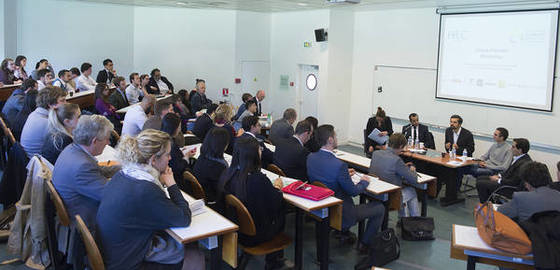HEC4Climate: Green Finance or the Need to Invest in Clean Energy
The pathway to reduce emissions and to limit global warming to 2°C will require substantial investment in clean energy technology. During the event: “The 2°C Challenge, Climate is our Business” – co-organized by HEC Paris, its SnO Center and HEC Alumni on October 1st 2015 – students, professors, and business partners met for a workshop entitled Green Finance.

The participants, who included Afshin Mehrpouya, HEC Paris Professor, Mustapha Mokass, Founder of consulting firm Beya Capital, founder of Climate and Poverty Innovations, Orith AZOULAY, Head of SRI Research, Natixis, Yann Louvel, Climate and Energy Campaign Coordinator, BankTrack and Lionel Cormier from Demeter Partners, discussed the critical role that investment plays in clean energy regarding the growing demand for electricity.
The Global Commission on Energy and Climate recommends an annual investment of US$1 trillion in clean energy to shift the energy sector away from fossil fuel dependency. The scale of necessary investments will require significant collaboration. Decisions will be complex concerning the growing demand for electricity, the need to maintain energy stability, and the need to expand electricity access to the nearly 1.7 billion people around the world who currently lack access. Despite the challenges, investment will be a key feature in the COP21 Paris conference and in the future, because if achieved, an annual US1$ trillion investment in clean energy could reduce annual GHG emissions in 2030 by 5.5-7.5 GtCO2 emissions.
As the moderator of the session, Mr. Mehrpouya provided a brief overview of the main ideas behind “Green Finance” and some of the stakeholders involved, including: NGO’s, Governmental Development Agencies, Investors and various religious leaders. Later in the day, a video of the UN Secretary General Mr. Ban Ki-moon was shown, in which he warned the world leaders about the importance of Climate Change for the future of humanity. Mr. Mehrpouya concluded the introductory section by providing examples of recent developments in the ‘Green Finance’ field, including: Investment in the transition economies, engagement with the portfolio of companies with focus on Climate Change, and the future divestment from fossil fuels.
After that, Mrs. Orith Azoulay, the head of SRI research at Nataxis, presented an overview of the recent trends in sustainable investments at one of the major asset management and investment banking corporations in France. According to Mrs. Azoulay, during the past five years, due to environmental liabilities, regulations and the change in the mind-set of asset owners, assets managers and investment banks have begun to pay special attention to the role of SRI. In Mr. Azoulay’s view, SRI can help achieve the goals of the UN Climate Summit via the following course of actions: 1) Reorient capital from fossil fuels to renewable energy, as well as increasing the investment in clean tech and “Green Bonds”; 2) Carbon impact measurement (scope 1, 2 and 3); 3) Engagement and the proper use of investor activism.
Next, Mr Yann Louvel, Climate and Energy Campaign Coordinator at BankTrack, briefly talked about the focus of BankTrack and the role of other NGOs in SRI. BankTrack, with assistance from similar NGOs, brings media attention to the issue of major banks’ investments in the coal sector (at the moment, over 75% of the banks around the globe have direct investments in coal). Taking advantage of COP21, BankTrack is currently in the process of launching a new initiative called “Paris Pledge”, with the goal of pressuring major banks to divest from coal related investment. Mr. Lionel Cormier, Managing Partner and Member of the Management Board at Demeter Partners, spoke about the commitment of Demeter Partners in sustainable investment especially in regards to the issue of water and energy efficiency. According to Mr. Cormier, one of the major developments in the area related to investment in Green Technologies is that many companies operating in this field are now able to remain profitable without the use of subsidies or other related governmental tax initiatives.
Finally, Mr. Mustapha Mokass, the founder of consultancy firm Beya Capital, emphasized the importance of joint ventures between public and private sector in developing countries as a means of tackling the issues related to climate change. In Mr. Mokass’ view, the lack of coordination between private companies and publicly funded ecological/environmental projects is one of the major obstacles that must be discussed during COP21 in Paris.
Read more...
HEC4Climate: the Challenges of the Sustainable Cities
HEC4Climate: How Business Can Help Tackle Climate Change
HEC4Climate: "We are heading towards a smart green digital economy" Jeremy Rifkin